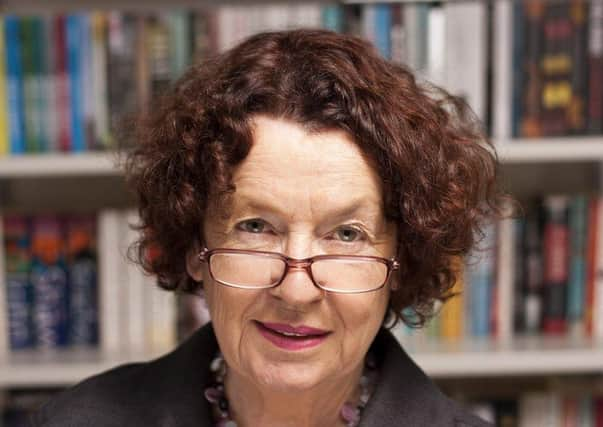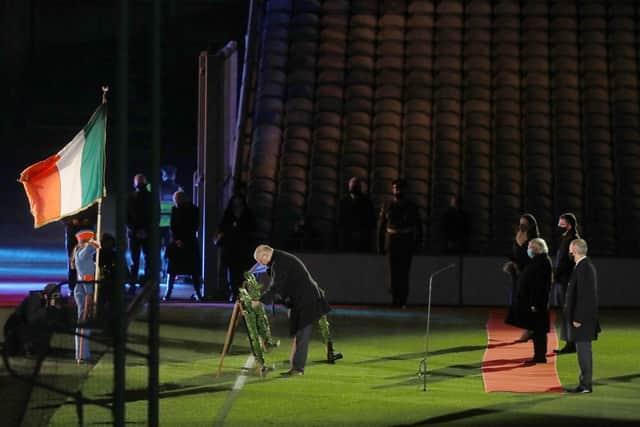Ruth Dudley Edwards: President Higgins struck right note on the centenary of Bloody Sunday


For instance, in his official statements after their deaths, he could hardly find a single good word to say about Margaret Thatcher, former prime minister of Ireland’s nearest neighbour, while his tribute to totalitarian Cuba’s Fidel Castro was tear-stained.
But he came up trumps this weekend with a fine statement about the centenary of Bloody Sunday.
Advertisement
Hide AdAdvertisement
Hide AdThere are still arguments about what exactly happened on 21 November 1920 that day, but the bald facts are that in the morning, the Squad, Michael Collins’s group of assassins, shot in cold blood 15 men they alleged were spies: eight of the 15 were not intelligence officers and three were civilians.


In the afternoon, at a Gaelic football match in Croke Park which was raising money for the Republican Dependants’ Prisoners’ Fund, some of the 195 armed police ordered to stop the game and search all the males attending ran amok and killed 14: the subsequent Military Inquiry judged they did so without orders and their actions were “indiscriminate” and “unjustified”.
And in the evening three arrested men were interrogated violently and murdered in Dublin Castle by their captors: two were senior IRA men and one an unlucky bystander.
In my view, there were two major war crimes that day.
Inevitably, though, most of the coverage of the atrocities has been shockingly ill-informed and one-sided.
Advertisement
Hide AdAdvertisement
Hide AdWhen I was growing up in Dublin in the 1950s and 60s, a visiting Martian would have thought the only people who had died in 1916 were the seven executed signatories of the Proclamation.
I had been encouraged by the efforts of senior southern politicians to make 2016 a year in which all deaths were recognised. But that same Martian would have concluded last weekend that in 1920 out of sheer badness the British authorities had ordered random fatal attacks on football fans.
To my disappointment, the Taoiseach acknowledged only the nationalist dead. Micheál Martin is by training and interest an historian who stands up to Sinn Féin, courageously fights their fellow-travellers in his Fianna Fáil party, and genuinely tries to reflect the complexities of Irish history and treat unionism with respect.
But he tweeted: “Bloody Sunday 1920 is remembered as one of the most poignant days in our struggle for independence. The violence of what happened in Croke Park still has the capacity to shock and move us. A hundred years on, we remember the 14 people who lost their lives that day.”
Advertisement
Hide AdAdvertisement
Hide AdIt was a pretty poignant day for the descendants of the morning’s carnage too, Taoiseach.
However, the statement President Higgins issued began: “At the close of that day of such killing and injury 100 years ago, 32 people, three of them children, lay dead or dying in Dublin. Countless others were wounded, many with their lives irrevocably changed as a result of the events of the day. More death and heartbreak was to follow.”
These events, he said, were still “selectively recalled for various purposes,” and that as well as causing “a sense of profound sadness and outrage” they are also “a reminder of the fragility of the hardened peace to which we have become accustomed.”
People from different backgrounds on the island might see Bloody Sunday in different ways: “We must respect this and be open to different perspectives, and encourage hospitality for these differing narratives of the events of that day. For all of us, to avoid becoming captives of any frozen version of the events of our past, we must find the courage to remember painful events with honesty.”
Advertisement
Hide AdAdvertisement
Hide AdIn a tweet welcoming the president’s words, Doug Beattie MC, MLA applauded him for remembering “while so many others choose to forget – all those who died this day hundred years ago. None of them woke up that day expecting to die. He has reached out & I applaud him for doing so”.
Such balance had little traction on social media.
In a powerful article in the Sunday Independent, Eoghan Harris spoke of his forebodings about Ireland, which comes from “the stream of anti-British sewage that surges every day through both mainstream and social media under cover of Brexit”.
He has never, he says, “known such Anglophobia but I do know it will end badly”.
He blames three influencers for inciting or surfing the wave of post-Brexit anti-Britishness: “the army of Sinn Féin trolls who smash into silence anyone trying to remind us of our own crimes against humanity”; the Irish Times for more than four years of “posh anti-Brexit polemics which gave bourgeois nationalists permission to Brit-bash and even vote Sinn Féin”; and RTE’s “non-stop stream of nationalist necrophilia, with no balancing programs such as Spotlight on the Troubles and Cops on the Frontline.
Advertisement
Hide AdAdvertisement
Hide AdI’m more of an optimist than Eoghan, but I fear that the ignorant and the amnesiac as well as the gullible in the country in which I grew up may follow the Sinn Féin Pied Piper.
We could all benefit from reaching out like President Higgins and Doug Beattie.
• Ruth Dudley Edwards is author of The Seven: The Lives And Legacies Of The Founding Fathers Of The Irish Republic
——— ———
A message from the Editor:
Thank you for reading this story on our website. While I have your attention, I also have an important request to make of you.
Advertisement
Hide AdAdvertisement
Hide AdWith the coronavirus lockdown having a major impact on many of our advertisers — and consequently the revenue we receive — we are more reliant than ever on you taking out a digital subscription.
Subscribe to newsletter.co.uk and enjoy unlimited access to the best Northern Ireland and UK news and information online and on our app. With a digital subscription, you can read more than 5 articles, see fewer ads, enjoy faster load times, and get access to exclusive newsletters and content. Visit https://www.newsletter.co.uk/subscriptions now to sign up.
Our journalism costs money and we rely on advertising, print and digital revenues to help to support them. By supporting us, we are able to support you in providing trusted, fact-checked content for this website.
Alistair Bushe
Editor